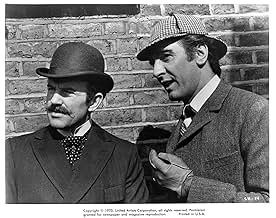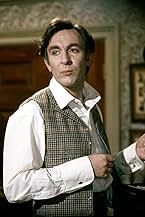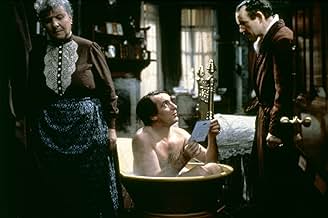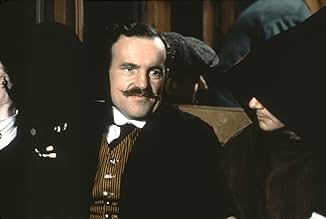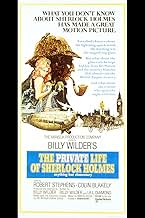When a bored Holmes eagerly takes the case of Gabrielle Valladon after an attempt on her life, the search for her missing husband leads to Loch Ness and the legendary monster.When a bored Holmes eagerly takes the case of Gabrielle Valladon after an attempt on her life, the search for her missing husband leads to Loch Ness and the legendary monster.When a bored Holmes eagerly takes the case of Gabrielle Valladon after an attempt on her life, the search for her missing husband leads to Loch Ness and the legendary monster.
- Director
- Writers
- Stars
- Awards
- 3 nominations total
Geneviève Page
- Gabrielle Valladon
- (as Genevieve Page)
- Director
- Writers
- All cast & crew
- Production, box office & more at IMDbPro
7.014.5K
1
2
3
4
5
6
7
8
9
10
Featured reviews
Subtle and atmospheric
As a Conan Doyle purist, I had not intended to watch this film when it first appeared on UK TV some years ago. Curiosity overcame me and I switched on at the sequence with Stephens and Genevieve Page on their bicycle. I was immediately fascinated, particularly by the music, which appears to have been specially written for this scene. Elsewhere, in the film, the music is taken from Rozsa's 1956 violin concerto which, unusually, was not written as film music but which partly inspired Wilder to produce the film.
The acting is excellent, particularly by Stephens, slightly less so by Blakely although Watson is probably the most difficult Doylesian character to play. Clive Revill has also been praised for his part. Christopher Lee gives an early display of his impeccable technique. Genevieve Page is perfect in her role and the subtle nuances of her acting are a joy to behold. She also has a beautiful voice, with a wide vocal range.
There is also some brilliant casting. Stanley Holloway as a gravedigger is a witty reference to his playing of that part in Olivier's Hamlet, although his Scottish accent is not the most convincing. Irene Handl made an excellent Mrs Hudson. Frank Thornton was also a fine choice for the tiny part of receptionist at the Diogenes Club. Britons of a certain generation, had they been able to see the missing episodes, would have recognised Noel Johnson as the sea captain in the Naked Honeymooners episode. Johnson had a distinctive and powerful voice and became famous in 1948 as the BBC fictional radio detective Dick Barton.
It is, of course, sad that significant parts of the film have been lost. Nevertheless, In its shortened form, it works well for cinema presentation. Now that domestic DVD players are common, a full-length version would be perfectly acceptable, since viewers would have control over which parts, if any, they might want to skip through. Meanwhile, the German Spy episode in particular stands beautifully on its own. Wilder creates a wonderful feeling of the atmosphere of 1888. The outdoor scenes in Scotland also provide a nostalgic feeling for the year in which filming took place there; presumably 1969 for the 1970 release.
The acting is excellent, particularly by Stephens, slightly less so by Blakely although Watson is probably the most difficult Doylesian character to play. Clive Revill has also been praised for his part. Christopher Lee gives an early display of his impeccable technique. Genevieve Page is perfect in her role and the subtle nuances of her acting are a joy to behold. She also has a beautiful voice, with a wide vocal range.
There is also some brilliant casting. Stanley Holloway as a gravedigger is a witty reference to his playing of that part in Olivier's Hamlet, although his Scottish accent is not the most convincing. Irene Handl made an excellent Mrs Hudson. Frank Thornton was also a fine choice for the tiny part of receptionist at the Diogenes Club. Britons of a certain generation, had they been able to see the missing episodes, would have recognised Noel Johnson as the sea captain in the Naked Honeymooners episode. Johnson had a distinctive and powerful voice and became famous in 1948 as the BBC fictional radio detective Dick Barton.
It is, of course, sad that significant parts of the film have been lost. Nevertheless, In its shortened form, it works well for cinema presentation. Now that domestic DVD players are common, a full-length version would be perfectly acceptable, since viewers would have control over which parts, if any, they might want to skip through. Meanwhile, the German Spy episode in particular stands beautifully on its own. Wilder creates a wonderful feeling of the atmosphere of 1888. The outdoor scenes in Scotland also provide a nostalgic feeling for the year in which filming took place there; presumably 1969 for the 1970 release.
Thoroughly civilised, delightful entertainment
Billy Wilder's take on the world's most famous detective is both painstakingly faithful and sardonically subversive to Sir Arthur Conan Doyle's idiossyncratic creation. Presented as a case that loyal companion John Watson duly recorded but requested remain secret until long after his death, in which Holmes aids a Belgian woman find her missing husband, a mining engineer hired by an apparently non-existant English company, it makes clever use of the rulebook Conan Doyle set down while at the same time undermining it from within. The title and the plot may seem misleading at first - the first half hour especially seems at odds with what comes afterwards - but in fact if you're a Holmes fan you'll quickly realise that this is as close to romance as the detective would ever allow, and Wilder tells it through a masterful accumulation of small touches that only someone as meticulous as the man himself would notice. Script-wise, it's a cracking mystery in the best Doyle tradition, with all the time-honoured twists and turns present and correct. The acting is also up to Wilder's usual standards; Stephens and Blakely are an engaging duo as a bored Holmes and a bumbling Watson, and there's a hysterically funny supporting turn by the always underrated Revill as a Russian ballet impresario. Wilder's trademark pointed cynicism fits the English witticism particularly well, even if at times it all seems a bit too modern for the peaceful Victorian surroundings, but it is quite ironic to see him chiding Britain's stiff-upper-lip, old-fashioned morality when the film seems to be an "old timers' movie" entirely out of sync with its own time. Still, it's hard to find fault in such a thoroughly civilised and delightful entertainment.
Strange but enjoyable
Sherlock Holmes (Robert Stephens) and Dr. Watson (Colin Blakely) get involved in a very weird case involving a mysterious French woman (Geneuieve Page), Sherlock's brother Mycroft (Christopher Lee), midgets, Scotland, the Queen and the Loch Ness Monster! Believe it or not they all come together. I originally saw this on TV back in the late 70s but it was so heavily edited (for instance, the entire first half hour was gone because it dealt with gay characters which was still a taboo on TV back then) that I couldn't follow it and gave up. Now it's back on uncut and I'm glad I'm finally able to see it.
A very strange movie but lots of fun. Some people think this is a spoof. It really isn't but there are some very funny moments--my favorite is at the beginning when Holmes blasts Watson for how he writes about his cases--"Watson, I've never said 'elementary my dear Watson' in my life!""Poetic license Holmes". There's also quite a few funny one liners mostly delivered with great relish by Stephens and it does deal with the sexual relations of Holmes and Watson (it was hinted that they were gay lovers). But it does involve a very serious case and the jokes stop towards the end.
Stephens is actually very good as Holmes--he won't make you forget Basil Rathbone but he's not bad. Colin Blakely isn't as big a buffoon as Nigel Bruce was but he tends to overact a little. Page is just terrible as the mystery woman--but then again, English is her second language. Lee, surprisingly, is kind of stiff as Mycroft. He's a very good actor--I'm surprised to see him so bad.
The movie is very lavish (probably because Billy Wilder was involved)...a lot of money and attention was given to sets and costumes, and they actually went on location to shoot the end in Scotland. The cinematography is just beautiful and the movie was never dull. It doesn't always mix the comedy with the drama successfully but it works more often than it misses. As most people know this was HEAVILY edited before it was released and the uncut version doesn't seem to exist anymore. That's too bad but what remains is not bad. Worth catching...a must see for Holmes fans.
A very strange movie but lots of fun. Some people think this is a spoof. It really isn't but there are some very funny moments--my favorite is at the beginning when Holmes blasts Watson for how he writes about his cases--"Watson, I've never said 'elementary my dear Watson' in my life!""Poetic license Holmes". There's also quite a few funny one liners mostly delivered with great relish by Stephens and it does deal with the sexual relations of Holmes and Watson (it was hinted that they were gay lovers). But it does involve a very serious case and the jokes stop towards the end.
Stephens is actually very good as Holmes--he won't make you forget Basil Rathbone but he's not bad. Colin Blakely isn't as big a buffoon as Nigel Bruce was but he tends to overact a little. Page is just terrible as the mystery woman--but then again, English is her second language. Lee, surprisingly, is kind of stiff as Mycroft. He's a very good actor--I'm surprised to see him so bad.
The movie is very lavish (probably because Billy Wilder was involved)...a lot of money and attention was given to sets and costumes, and they actually went on location to shoot the end in Scotland. The cinematography is just beautiful and the movie was never dull. It doesn't always mix the comedy with the drama successfully but it works more often than it misses. As most people know this was HEAVILY edited before it was released and the uncut version doesn't seem to exist anymore. That's too bad but what remains is not bad. Worth catching...a must see for Holmes fans.
Particular adaptation based on the classic characters about famed sleuth and his helper
When a bored Holmes (Robert Stephens who also played Holmes on the stage and in TV series 'The Rivals of Sherlock Holmes') eagerly takes the case of Gabrielle Valladon (Genevieve Page) after an attempt on her life , the search for her missing husband leads to Sherlock and Watson (Colin Blakely) towards Loch Ness and the legendary monster. This affectionate story reveals the secret allegedly hidden by Holmes and Watson .
Atypical Holmes movie , resulting to be a extremely personal pastiche of the Arthur Conan Doyle stories and takes a melancholic point of sight at famous eye private . It is packed with intrigue , thrills , emotion , taste , wit , and of course ,intrigue . In the flick appears the usual of the Arthur Conan Doyle's novels : Mycroft (Sherlock's brother , well played by Christopher Lee) , Mistress Hudson (Irene Handl) , and as always Doctor Watson (Colin Blakely). Furthermore , a notorious secondary cast as Clive Revill , Stanley Holloway as an undertaker , Catherine Lacey in her last cinema film and the classic dancer Tamara Toumanova . The film has an enjoyable atmosphere , it's in wonderful color that originates a glamorous setting created by the magnificent cameraman Chistopher Challis , and filmed at Pinewood Studios , Buckinghamshire, and Inverness , Highland , Scotland . Production design by the expert Alexandre Trauner is of first rate , the movie is very atmospheric , 221 Baker Street home , the streets of London , castles are very well designed .
Robert Stephens's interpretation is magnificent, he's one of the best Sherlock Holmes in the cinema , likeness to Peter Cushing and Jeremy Brett in television. Robert Stephens as Holmes plays in a clever , broody and impetuous manner . Colin Blakely plays as Watson with humor, goofy and joy , he's the perfect counterpoint to Holmes . However , initially Peter O'Toole was going to play Sherlock Holmes with Peter Sellers playing Dr. Watson, but Billy Wilder decided to go with lesser known stars instead . Originally, the scenes featuring the Loch Ness Monster were intended to be filmed in the actual Loch , a life-size prop was built which had several Nessie-like humps used to disguise flotation devices , the humps were removed, however, at Billy Wilder's request. Unfortunately, during a test run in Loch Ness, the Monster-prop sank and was never recovered ; a second prop was built, but was only filmed inside a studio tank . At the request of director Billy Wilder, composer Miklós Rózsa adapted music from his own Violin Concerto , opus 24 , as the basis for the film score, supplementing this with further original music.
This special Billy Wilder movie takes melancholy look at Holmes . Apparently, he had been a fan of Sherlock Holmes for many years prior to making this picture. Wilder said of this flick in the book 'Conversations with Wilder' by 'Cameron Crowe' : " when I came back from Paris, it was an absolute disaster, the way it was cut. The whole prologue was cut, a half-sequence was cut , in fact it was intended as a 3 and half hour film . I had tears in my eyes as I looked at the thing. It was the most elegant picture I've ever shot ¨ . The motion picture was panned by the critics whose reputation should soar in future years , being recently a 12 minutes restored . Rating : Better than average , 7/10 . Well worth watching .
Atypical Holmes movie , resulting to be a extremely personal pastiche of the Arthur Conan Doyle stories and takes a melancholic point of sight at famous eye private . It is packed with intrigue , thrills , emotion , taste , wit , and of course ,intrigue . In the flick appears the usual of the Arthur Conan Doyle's novels : Mycroft (Sherlock's brother , well played by Christopher Lee) , Mistress Hudson (Irene Handl) , and as always Doctor Watson (Colin Blakely). Furthermore , a notorious secondary cast as Clive Revill , Stanley Holloway as an undertaker , Catherine Lacey in her last cinema film and the classic dancer Tamara Toumanova . The film has an enjoyable atmosphere , it's in wonderful color that originates a glamorous setting created by the magnificent cameraman Chistopher Challis , and filmed at Pinewood Studios , Buckinghamshire, and Inverness , Highland , Scotland . Production design by the expert Alexandre Trauner is of first rate , the movie is very atmospheric , 221 Baker Street home , the streets of London , castles are very well designed .
Robert Stephens's interpretation is magnificent, he's one of the best Sherlock Holmes in the cinema , likeness to Peter Cushing and Jeremy Brett in television. Robert Stephens as Holmes plays in a clever , broody and impetuous manner . Colin Blakely plays as Watson with humor, goofy and joy , he's the perfect counterpoint to Holmes . However , initially Peter O'Toole was going to play Sherlock Holmes with Peter Sellers playing Dr. Watson, but Billy Wilder decided to go with lesser known stars instead . Originally, the scenes featuring the Loch Ness Monster were intended to be filmed in the actual Loch , a life-size prop was built which had several Nessie-like humps used to disguise flotation devices , the humps were removed, however, at Billy Wilder's request. Unfortunately, during a test run in Loch Ness, the Monster-prop sank and was never recovered ; a second prop was built, but was only filmed inside a studio tank . At the request of director Billy Wilder, composer Miklós Rózsa adapted music from his own Violin Concerto , opus 24 , as the basis for the film score, supplementing this with further original music.
This special Billy Wilder movie takes melancholy look at Holmes . Apparently, he had been a fan of Sherlock Holmes for many years prior to making this picture. Wilder said of this flick in the book 'Conversations with Wilder' by 'Cameron Crowe' : " when I came back from Paris, it was an absolute disaster, the way it was cut. The whole prologue was cut, a half-sequence was cut , in fact it was intended as a 3 and half hour film . I had tears in my eyes as I looked at the thing. It was the most elegant picture I've ever shot ¨ . The motion picture was panned by the critics whose reputation should soar in future years , being recently a 12 minutes restored . Rating : Better than average , 7/10 . Well worth watching .
A surprisingly melancholy celebration of Conan Doyle's most famous creation
Billy Wilder's excellent 1970 film handles the whole subject of Sherlock Holmes from a refreshingly different angle. As the title suggests, the film is rather more concerned with characterisation than plot, which although entertaining and original, is hardly an adequate stage to show off Holmes' exceptional talents.
Instead, Wilder and Diamond start with the premise that "Watson's" stories for Strand Magazine were a little more lurid than the "reality" and use it to develop a more subtle characterisation than the "thinking machine" of the literary Holmes. Admittedly, the film probably concentrates on Holmes' celebrated cocaine habit more than it should, but all references are lifted straight from the book and in any case, Stephens does not dwell on it.
Stephens himself is quite simply excellent, giving Holmes' a depth of character not seen again until Jeremy Brett on the small screen. Stephens' performance leaves us with a slightly melancholy Holmes', a man who perhaps regrets that, unlike Watson, he has dedicated his life to pure reason and while the screenplay hints at Holmes' sexuality, Stephens deflects it masterfully, remaining ambivalent and gentile where a less accomplished actor would have been simply camp, and so uses the suggestion to wrap another layer of ambiguity about the character.
All in all, Wilder and Stephens combine to make a refreshingly accessible Holmes and the entertainment comes from the interplay of characters rather than pace of plot.
Instead, Wilder and Diamond start with the premise that "Watson's" stories for Strand Magazine were a little more lurid than the "reality" and use it to develop a more subtle characterisation than the "thinking machine" of the literary Holmes. Admittedly, the film probably concentrates on Holmes' celebrated cocaine habit more than it should, but all references are lifted straight from the book and in any case, Stephens does not dwell on it.
Stephens himself is quite simply excellent, giving Holmes' a depth of character not seen again until Jeremy Brett on the small screen. Stephens' performance leaves us with a slightly melancholy Holmes', a man who perhaps regrets that, unlike Watson, he has dedicated his life to pure reason and while the screenplay hints at Holmes' sexuality, Stephens deflects it masterfully, remaining ambivalent and gentile where a less accomplished actor would have been simply camp, and so uses the suggestion to wrap another layer of ambiguity about the character.
All in all, Wilder and Stephens combine to make a refreshingly accessible Holmes and the entertainment comes from the interplay of characters rather than pace of plot.
Did you know
- TriviaBy the time of filming, Sir Christopher Lee had become famous as Count Dracula. When he and Billy Wilder walked on the shores of Loch Ness at dusk, with bats circling overhead, Wilder said to him, "You must feel quite at home here."
- GoofsThe events start in August 1887 and apparently take place in the following weeks or, at most, months. However, Mycroft Holmes tells Queen Victoria that Kaiser Wilhelm II had Count Zeppelin working on dirigibles that could drop bombs on Buckingham Palace. Wilhelm II did not become Kaiser until 15 June 1888, and Zeppelin did not start constructing rigid airships until the 1890s.
- Alternate versionsOriginally released at 125 minutes; the US laserdisc version adds 12 minutes of unreleased footage, including a sequence known as "The Dreadful Business of the Naked Honeymooners", featuring Jonathan Cecil and Nicole Shelby
- ConnectionsFeatured in The Many Faces of Sherlock Holmes (1985)
- SoundtracksConcerto for Violin and Orchestra Opus 24
by Miklós Rózsa
Details
- Release date
- Countries of origin
- Languages
- Also known as
- Das Privatleben des Sherlock Holmes
- Filming locations
- Production companies
- See more company credits at IMDbPro
Box office
- Budget
- $10,000,000 (estimated)
- Gross worldwide
- $19,930
Contribute to this page
Suggest an edit or add missing content


